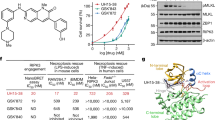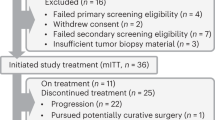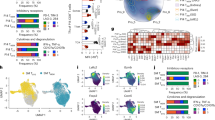Abstract
Adenovirus-mediated gene transfer of interferon gamma (AdIFN) elicits rejection of intracerebral Lewis lung carcinoma. In this system, gene transfer into brain parenchymal cells is both necessary and sufficient to generate the antitumor response. Despite persistent parenchymal inflammation and demyelination, wild-type mice injected intracerebrally with either AdIFN or β-galactosidase adenovirus (AdBGAL) perform as well as non-injected animals in behavioral, memory, and motor tests. Both AdIFN and AdBGAL elicit demyelination whose incidence rises sharply when the lowest effective dose of AdIFN is exceeded. Therefore, transfer of interferon gamma into brain parenchyma does not seem to elicit detectable cognitive, behavioral or motor deficits. Furthermore, gene transfer into the brain, by adenoviral vectors currently in clinical trials, is associated with a narrow therapeutic window where the incidence of demyelination rises sharply soon after the effective dose is achieved.
This is a preview of subscription content, access via your institution
Access options
Subscribe to this journal
Receive 12 print issues and online access
$259.00 per year
only $21.58 per issue
Buy this article
- Purchase on Springer Link
- Instant access to full article PDF
Prices may be subject to local taxes which are calculated during checkout



Similar content being viewed by others
References
Fathallah-Shaykh H . New molecular strategies to cure brain tumors Arch Neurol 1999 56: 449–453
Fathallah-Shaykh HM, Zhao LJ, Mickey B, Kafrouni AI . Molecular advances to treat cancer of the brain Exp Opin Invest Drugs 2000 9: 1207–1215
Fathallah-Shaykh HM, Gao W, Cho M, Herrera MA . Priming in the brain, an immunologically-privileged organ, elicits anti-tumor immunity Int J Cancer 1998 75: 266–276
Fathallah-Shaykh HM et al. Gene transfer of IFN-γ into established brain tumors represses growth by antiangiogenesis J Immunol 2000 164: 217–222
Fathallah-Shaykh HM et al. Gene transfer into brain parenchyma elicits antitumor effects Cancer Res 2000 60: 1797–1799
Byrnes AP, Rusby JE, Wood MJA, Charlton HM . Adenovirus gene transfer causes inflammation in the brain Neuroscience 1995 66: 1015–1024
Yang Y, Su Q, Wilson JM . Role of viral antigens in destructive cellular immune responses to adenovirus vector-transduced cells in mouse lungs J Virol 1996 70: 7209–7212
Dewey RA et al. Chronic brain inflammation and persistent herpes simplex virus 1 thymidine kinase expression in survivors of syngeneic glioma treated by adenovirus-mediated gene therapy; implications for clinical research Nature Med 1999 5: 1256–1263
Marshall E . FDA halts all gene therapy trials at Penn Science 2000 287: 565–566
Marshall E . Gene therapy on trial Science 2000 288: 951–957
Ogawa S, Lubahn DB, Korach KS, Pfaff DW . Behavioral effects of estrogen receptor gene disruption in male mice Proc Natl Acad Sci USA 1997 94: 1476–1481
Stafstrom CE et al. Age dependent cognitive and behavioral deficits after kainic acid seizures Epilepsia 1993 34: 420–432
Dunn AJ, Swiergiel AH . Behavioral responses to stress are intact in CRF-deficient mice Brain Res 1999 845: 14–20
Chaouloff F, Kulikov A, Mormede P . Repeated DOI and SR 46349B treatments do not affect elevated plus-maze despite opposite effects on cortical 5-HT2a receptors Eur J Pharmacol 1997 334: 25–29
Hsiao K et al. Correlative memory deficits, Aβ elevation, and amyloid plaques in transgenic mice Science 1996 274: 99–102
Morris, R . Development of a water-maze procedure for studying spatial learning in the rat J Neurosci Res 1984 11: 47–60
Ho CS, Grange RW, Joho RH . Pleiotropic effects of a disrupted K+ channel gene: reduced body weight, impaired motor skill and muscle contraction, but no seizures Proc Natl Acad Sci USA 1997 94: 1533–1538
Rogan MT, Staubli UV, LeDoux JE . Fear conditioning induces associative long-term potentiation in the amygdala Nature 1997 390: 604–607
Mayford M et al. Control of memory formation through regulated expression of a CaMKII transgene Science 1996 274: 1678–1683
Bach ME et al. Impairment of spatial but not contextual memory in CaMKII mutant mice with selective loss of hippocampal LTP in the range of the θ frequency Cell 1995 81: 905–915
Garcia JA et al. Impaired cued and contextual memory in NPAS2-deficient mice Science 2000 288: 2226–2230
Acknowledgements
This work was supported by grants from the National Cancer Institute (R01-CA81367 and R29-CA78825 to HM Fathallah-Shaykh). Statistical analysis was supported by the Simmons Cancer Center at the University of Texas Southwestern Medical Center at Dallas. We are grateful to Roger Rosenberg for discussions and encouragement. We would also like to acknowledge the support of Mr Theodore Strauss and the Annette Strauss Center for Neuro-Oncology at UT Southwestern Medical Center.
Author information
Authors and Affiliations
Rights and permissions
About this article
Cite this article
Fathallah-Shaykh, H., Kafrouni, A., Zhao, LJ. et al. Demyelination but no cognitive, motor or behavioral deficits after adenovirus-mediated gene transfer into the brain. Gene Ther 7, 2094–2098 (2000). https://doi.org/10.1038/sj.gt.3301346
Received:
Accepted:
Published:
Issue Date:
DOI: https://doi.org/10.1038/sj.gt.3301346
Keywords
This article is cited by
-
Dose-dependent effect of cannabinoid WIN-55,212-2 on myelin repair following a demyelinating insult
Scientific Reports (2020)
-
Reversal of Mdr1b-dependent Multidrug Resistance in a Rat Astrocyte Model by Adenoviral-delivered Short Hairpin RNA
Cellular and Molecular Neurobiology (2008)



